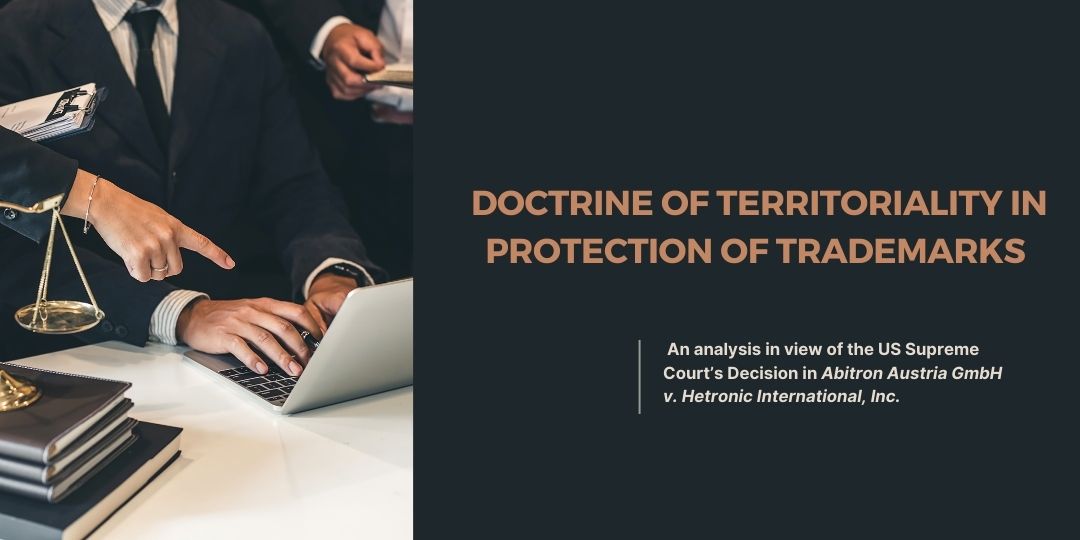Application of the Doctrine of Territoriality in Protection of Trademarks – An analysis in view of the US Supreme Court’s Decision in Abitron Austria GmbH v. Hetronic International, Inc.

Balaji. P, Principal Associate, IP Practice
The trademark territoriality principle has long been a fundamental aspect of international intellectual property laws, governing the scope and protection of trade marks across borders. Recently, the US Supreme Court’s decision in Abitron Austria GmbH v. Hetronic International, Inc. has brought renewed attention to this principle and its significance in the global trade and commerce. This article aims to examine the position of the territoriality principle in India with a focus on relevant case laws and explore the implications of the US Supreme Court’s ruling.
Introduction:
The trademark territoriality doctrine is a well-established and recognized principle of international law based on the idea that trademarks are territorial rights which only have legal effect in the country or region where it is registered. This means that the owner of a trademark has the exclusive right to use the same in the country or region where it is registered and does not have the right to prevent others from using the trademark in other countries. Since the trademark laws are primarily governed at the national level and each country has its own set of rules and requirements for registration and enforcement of Trademarks, the trademark territoriality principle respects the sovereignty of individual countries to determine their own trademark policies and rules to protect brands within their borders, which mandates trademark owners to comply with and benefit from the specific regulations of the countries they choose to register and protect their marks. The significance of trademark territoriality lies in providing clear boundaries for trademark rights and ensuring that the rights of trademark owners are respected within their chosen markets. It also allows for more efficient enforcement of trademark rights, as disputes are typically resolved within the jurisdiction where the trademark is registered. The principle also promotes fair competition by allowing multiple entities to enjoy ownership over honestly adopted and prior used same or similar trademarks in different geographic regions, as long as there is no actual or likelihood of confusion between the rival marks.
The need for Extraterritorial Protection of Trademarks:
Trademark territoriality principle can also pose challenges, especially in an increasingly globalised world where businesses operate across borders and since trade marks can also have extraterritorial effects. In the digitalized and globalised economy, trade marks are increasingly used in international commerce and the trademark owners are increasingly exposed to the risk of misuse of their brands in countries where they have no business or registration. The need for extraterritorial protection of trademarks is becoming increasingly important, as and when the trademark owners expand their businesses into new markets, they need to be able to protect their marks from infringement in such jurisdictions. Further, it is very important for the owners to track and protect their trademarks in all the prospective markets so that their entry in the said jurisdiction will be without any hurdles.
The rise of the internet has also made it more difficult to apply the trademark territoriality principle as the same allows businesses to easily sell their products and services to consumers in countries where they do not have a physical presence. When trademark owners are not able to protect their marks in other countries, it gives an unfair advantage to infringers who will be allowed to operate in those countries without fear of legal action. Further, the same can lead to confusion among consumers who will not be able to identify if they are buying the genuine products. Extraterritorial protection may also protect consumers from being misled by counterfeit goods.The extraterritorial nature of trademark rights can be a complex issue and there are several factors that can affect whether or not trade marks can be enforced extraterritorially, which include the laws of the country where the trade marks were registered, where the infringement or passing-off activities is taking place and the international treaties that the countries involved have ratified.
While securing registrations in the countries where the trademark owner wants to protect it, which is the most effective way to obtain extraterritorial protection when the mark is not used in such countries, it can be expensive and time-consuming. Further, in countries where use of the registered trademark is a requirement to maintain registration, it becomes an added burden on the owners. Another way to obtain extraterritorial protection is to seek common law remedy, which is available in some countries. Passing-off action based on the right in common law is maintainable even if the trademark is not registered or used in that country, if the same is a well-known trademark or has acquired trans-border reputation. In view of availability of such actions, the trademark territoriality principle is clearly not absolute as the well-known trademark exception recognizes that such marks have a reputation which extends beyond the borders of the country where they are registered and/or used.
Position in India:
The trademark territoriality principle is also recognized in India and the Trade Marks Act, 1999 which extends to the whole of India provides that the protection under the Act only has legal effect in India. However, the Courts in India have granted protection for a trademark which is well-known in India or enjoys a global reputation that has been spilled over to India, even if the said mark is not registered or used in India. The concept of transborder reputation and common law right of multinational companies having no active registration or use of the trademark in India was first recognized by the Supreme Court of India in N.R. Dongre and Ors. vs. Whirlpool Corporation and Ors. [(1996) 5 SCC 714], wherein it was held that in view of the plaintiff’s the prior use of the mark WHIRLPOOL and its trans-border reputation extending to India, the exercise of discretion by the trial Court in favor of the plaintiff was in accordance with the settled principles of law relating to the grant of interlocutory injunctions in a passing-off action.
Similarly, in the case of Milmet Oftho Industries and Ors. vs. Allergan Inc. [(2004) 12 SCC 624], the Apex Court, while holding that if a mark is associated with the plaintiff worldwide, allowing use of an identical mark for similar goods by the defendant it would lead to an anomalous situation, has also observed that “Multinational corporations, who have no intention of coming to India or introducing their product in India should not be allowed to throttle an Indian Company by not permitting it to sell a product in India, if the Indian Company has genuinely adopted the mark and developed the product and is first in the market”. The Court in the said case has further held that the ultimate test to identify the prior user is to see who is the first in the market and if the plaintiff were first in the world market, the mere fact that they have not been using the mark in India would be irrelevant.
The latest decision of the Supreme Court of India in this regard in Toyota Jidosha Kabushiki Kaisha vs. Prius Auto Industries Ltd. and Ors. [AIR 2018 SC 167] has given more clarity on the importance of territoriality principle and transborder reputation in protecting trademarks in India. The Apex Court in this case has expressed that it sees no reason why territoriality principle should not apply to India and held that to give effect to the said principle, the Courts must determine if there has been a spill-over of the reputation and goodwill of the Plaintiff’s mark prior to the use of the mark by the Defendant. On the basis of the documents produced, the Court observed that “the brand name of the Plaintiff’s car PRIUS had not acquired the degree of goodwill, reputation and the market or popularity in the Indian market so as to vest in the plaintiff the necessary attributes of the right of a prior user so as to successfully maintain an action of passing off”.
Enforcement of TradeMarks rights in India against parties located abroad:
The Courts in India, through numerous decisions in the past three decades, have well recognized the legal protection required for the multinational companies having no active registration or use of their mark in India only if the same has transborder/spillover reputation, thus emphasizing the applicability and relevance of territoriality principle in India. However, until recently, enforcement of trade mark rights protected in India against persons or companies located in other countries was not widely dealt with by the Courts in India. The Delhi High Court, in Independent News Service Pvt. Ltd. vs. India Broadcast Live LLC and Ors. [2007 (35) PTC 177 Del], has first noted that there is no long arm statute in India that deals with jurisdiction of Courts involving non-resident defendant and hence, the Courts have to see whether the defendant’s activities have connection with India. The Court, in the said case, further observed that the website of the defendant has options for subscription which can be availed of in Delhi within the jurisdiction of the Court and held that the defendant, an American entity having no physical presence in India, has sufficient connection with India and the Delhi High Court it can exercise personal jurisdiction over the defendant.
The single judge of the Delhi High Court in Tata Sons Private Limited vs Hakunamatata Tata Founders & Ors. [Neutral Citation: 2021:DHC:3371] commented that mere accessibility of the overseas defendant’s website by persons located within the jurisdiction of the Court is not sufficient, but interactivity of the said website and ‘purposeful targeting’ of Indian customers by the said defendant is required to invoke jurisdiction of the Court. The single judge was of the opinion that mere fact that some queries posted on the overseas defendant’s social media pages by persons in India or that the defendant’s website has 50 visitors from India every day cannot indicate any intent on the part of the said defendant to target the Indian market and held that there was no ‘purposeful availment’ by the defendants, of their activities, of the jurisdiction of the Court. However, the divisional bench of the Delhi High Court in an appeal under Tata Sons Private Limited vs Hakunamatata Tata Founders & Ors. [2022 (92) PTC 635 (Del)] did not agree with the single judge’s findings and held that “the fact that the people behind the offending website are stated to be UK nationals of Pakistani origin does make the motives suspicious, given the popularity of TATA brand among the people from Indian sub-continent. It is not unreasonable to infer that the objective of respondent No. 1 could be to target unsuspecting Indian origin public by doing trade in the name of TATA”. The divisional bench further observed that an interim injunction is necessary, if not for anything else, but just to avoid likelihood of confusion and deception or wrongful association of the offending website with the TATA group in the mind of the public in India.
Recently, the Delhi High Court in Dabur India Limited vs. Ashok Kumar and Others [(2022) 91 PTC 360], while hearing a batch of matters related to various domain names incorporating well-known trademarks of Indian entities, went on to issue directions to Domain Name Registrars (DNRs) having offices outside India after commenting that “While on the one hand, services of such companies are being offered in India and huge revenues are collected by these companies from India, it is seen that due to lack of physical office or assets in India, the orders passed are not being given effect to in an efficient and proper manner”. The Delhi High Court, vide its subsequent orders in the same batch of cases consolidated with CS (COMM) No. 135 of 2022, further directed the Ministry of Electronics and Information Technology (MeitY) to provide its recommendations in relation to the issues arising out of mode of registration of domain names, verification of domain names, privacy protect features, hosting of websites on the fraudulent domain names, etc., after conducting meeting and discussions with the different stakeholders. The Court has also taken steps to ensure strict compliance of the provisions of Rule 3(2)(a) of the Information Technology (Intermediary Guidelines and Digital Media Ethics Code) Rules, 2021, which mandates intermediaries, including DNRs which may not be located in India, to publish the name and contact details of Grievance Officer appointed by them who shall receive and acknowledge any order or direction issued by a Court. The Delhi High Court is presently hearing this batch of matters, particularly in relation to the steps that can be taken against DNRs who do not comply with the orders passed by the Court and a final judgment in this regard will provide further light on the measures that needs to be or can be taken by and against DNRs located outside India in respect of cybersquatting.
Decision of the US Supreme Court in Abitron Austria GmbH v. Hetronic International, Inc.
The applicability of the trademark territoriality principle in the United States of America was put to doubt when a jury in the Western District of Oklahoma awarded a US-based company (Hetronic) USD 115 million in damages of which about USD 96 million was in relation to violation of Hetronic’s trade mark rights by six German and Austrian parties (Abitron) primarily in the European countries. The US District Court for the Western District of Oklahoma rejected Abitron’s argument that the extraterritorial application of Sections 1114(1)(a) and 1125(a)(1) of the Lanham Act (US federal trademark statute) as sought by Hetronic is impermissible and the Court later entered permanent injunction restraining Abitron from selling products bearing Hetronic’s marks anywhere in the world.
On appeal, the US Court of Appeals for the Tenth Circuit, opined that EUR 1.7 million worth of infringing products (though constitute only 3% of Abitron’s total international sales) reached the United States and Abitron’s foreign conducts to sell those products caused confusion among US consumers, which is sufficient to give US a strong interest in the litigation. The Court of Appeals further rejected Abitron’s argument that such small fraction of sales in US cannot serve as a springboard to call rest of USD 90 million of purely foreign sales damages under the Lanham Act and observed that “the Supreme Court has made clear that once a court determines that a statute applies extraterritorially to a defendant’s conduct, as we do here, that statute captures all the defendant’s illicit conduct”.
The US Supreme Court on Writ of Certiorari, requesting to overturn the decision of the US Court of Appeals, under Abitron Austria GmbH v. Hetronic International, Inc., [Opinion dated 29 June 2023 in No. 21–1043] examined the issue of extraterritorial application of the Lanham Act and unanimously upheld the trademark territoriality principle by stating that Sections 1114(1)(a) and 1125(a)(1) of the Lanham Act are not extraterritorial and extend only to claims where the infringing use in commerce is domestic. The US Supreme Court in support of its opinion observed that neither of the said provisions gave a clear indication that the Congress intended the same to apply extraterritorially or that the same are ‘rare’ provisions that apply abroad. It further rejected Hetronic’s argument that the definition of the term ‘commerce’ as per Section 1127 of the Lanham Act includes ‘all commerce which may lawfully be regulated by Congress’ and repeated its earlier holding that even statutes that expressly refer to ‘foreign commerce’ when defining the term ‘commerce’ are not extraterritorial. Justice Sotomayor of the US Supreme Court filed an opinion, concurring in judgement, stating that the Lanham Act covers Abitron’s activities abroad so long as Hetronic can show that such activities are likely to deceive or cause confusion / mistake in the US and can prove all elements necessary to establish liability.
Implications of the Decision:
The US Supreme Court’s decision is significant because it reaffirms the presumption against extraterritoriality, which is an important principle of international law that helps to protect the sovereignty of other countries and ensures that countries do not overreach their authority by regulating conduct that occurs outside their borders. It is pertinent to note that the European Commission, in its brief amicus curiae filed in the present dispute before the US Supreme Court, stated that both Abitron and Hetronic have already invoked the laws of the European Union and Germany to protect their interests in Germany which includes fourteen trade mark related disputes between the parties pending before the courts and trade marks offices and also gave representative list of such cases where the European Court of Justice and Regional Court of Munich issued their decisions in favour of Hetronic. Interestingly, the US Supreme Court also noted the submission of the European Commission that “It would be unseemly at best for U.S. courts to police allegations of infringement occurring in Germany, thereby ignoring or disregarding decisions made in a foreign judicial system according to the laws that apply in that system, especially when those laws implement international treaty obligations that equally bind the United States.” as a warning before reiterating that the US law governs domestically but does not rule the world.
The ruling bolsters the territoriality principle and strengthens the notion that trademark rights are limited to the geographical boundaries of registration and use. This decision also ensures that US Courts will not entertain actions for extraterritorial trademark infringements unless the infringing activities are likely to cause confusion in the US. While it remains to be seen how the trademark territoriality principle will be applied in the future, with the world becoming a global village in terms of trade and business, it is clear that the principle is an important one that will continue to be debated by businesses and governments.



